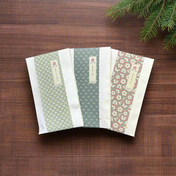Located in the southern part of Shiga prefecture and the western part of Shigaraki town (also famous for Shigarakiyaki ceramics ware), Asamiya is a hilly, rural region on the Shigaraki plateau (altitude 400 meters). The temperature change between night and day is drastic in this region creating a climate where mist forms frequently — an ideal climate for cultivating tea leaves.
In addition, a east-west band about 1 kilometer wide has been confirmed to contain nutrient-rich sediment from Lake Biwa when it was larger in ancient times. The soil is a multi-million-year gift from nature to the tea farmers with whom we work.
There is little wonder then why Asamiya is considered one of the five great ancient tea regions of Japan (the others being Sayama in Saitama, Uji in Kyoto, Shizuoka, and Yamato from Nara).
Asamiya has approximately 60 farmers farming on 120 hectares, and primarily use Yabukita cultivars. However, benifuki, okumidori, saemidori, sayama kaori, sayama midori, okuhikari, and asatsuyu are also cultivars farmed in this region.
The above info comes courtesy of Masami Higuchi, farmer and owner of the Kaneban Higuchi Tea Factory in Asamiya.
[product_category category=”higuchi” per_page=”12″ columns=”4″ orderby=”date” order=”desc”]
The post About Asamiyacha – one of the five great ancient tea regions of Japan appeared first on YUNOMI.



